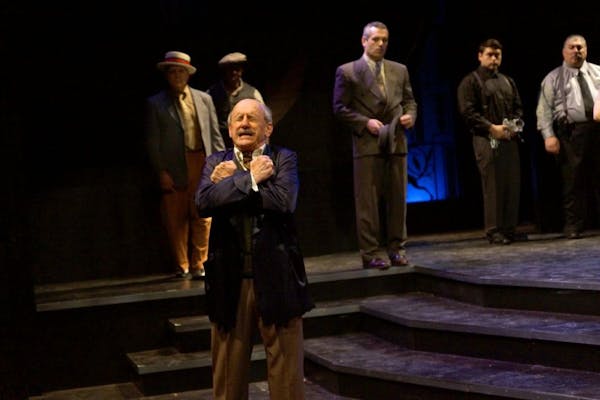To twist a phrase, the parts are greater than the sum in Park Square Theatre's production of "King Lear." This makes for an uneven experience full of equivocation. Moments shriek with grisly electricity and fearless stagecraft; others yawn with fuzzy exposition and an opaque orientation of place and narrative.
Director Peter Moore has set his "Lear" in Prohibition-era America. Lear (Raye Birk) is an aging mob boss dividing territories among three daughters. Goneril (Jennifer Blagen) and Regan (Stacia Rice) flatter the old man with dripping declarations of affection. Cordelia (Adelin Phelps) is less eloquent, and her reluctance to ingratiate herself sends Lear into a rage. He disowns Cordelia, and the calculating older sisters split the spoils.
Meanwhile, Gloucester (Stephen D'Ambrose) has his own familial problems. His bastard son Edmund (Jim Lichtscheidl) has connived to usurp the birthright of legitimate Edgar (Dan Hopman).
The whole bloody mess sprawls out in a tragic soap opera of madness, destruction and death.
Moore's concept does not fully crystallize. Whenever Shakespeare is appropriated for another age, anachronisms and language become an issue. The set, elegantly appointed by designer Rick Polenek, is an empty palette that never convinces us of a place and time. Themes evolve from an accumulation of detail, and here we miss those details. Gangsters declaiming about France and Cornwall and Kent should be talking about Jersey, Chicago and New York.
The first act, particularly, does not tell the story well, with its shifting alliances and evident treachery. Despite well-observed performances, there is no grounding or anchor.
The high drama of the second act depends less on location. Birk half convinces us that he himself has lost his mind in portraying Lear's dementia. Desperately unable to grasp what has happened to him, Lear's soul rebels against itself in acts of self-hatred. Birk's performance is simply epic in its investigation of a man who has become unstuck.
The play does not provide the elements for any other actor to approach Lear. However, E.J. Subkoviak makes Cornwall a sadistic terrorist and Rice's Regan eagerly revels in the gory details of their deeds; Lichtscheidl shows well Edmund's cunning deceit and Gary Briggle occupies a large part of the play's psyche as the Fool. He refreshes with comedy and declares certain wisdom. Hopman and D'Ambrose share the empathy of redemption when Gloucester and Edgar reunite.
Moore has wrought a devastating conclusion, again built upon Birk's embrace of Lear's abject agony. The tragedy becomes personal, and Lear -- stripped of power and all earthly possessions -- is nothing more than a small man defeated by his own hubris.
The opportunity to watch Birk -- one of the Twin Cities' best actors -- invest in Shakespeare's ruthless portrayal of madness is enriching. That reward, though, is tempered within a bumpy production.
Graydon Royce • 612-673-7299

Minnesota Sports Hall of Fame: A class-by-class list of all members

This retired journalist changed professional wrestling from Mankato

